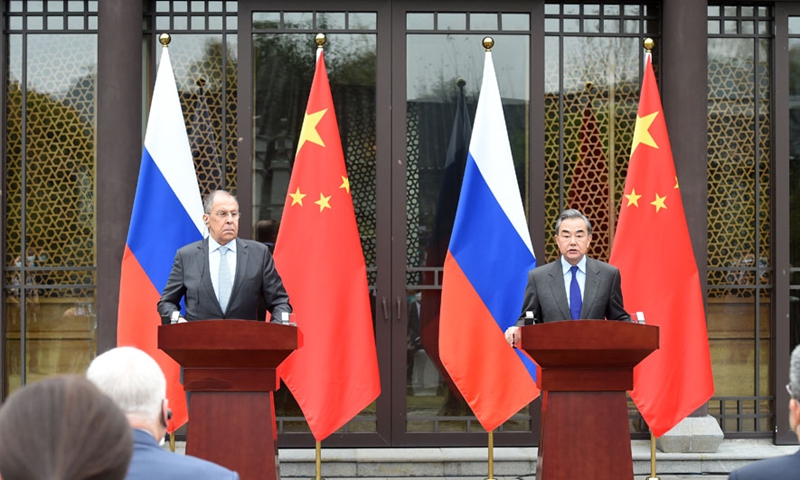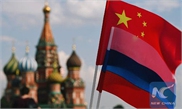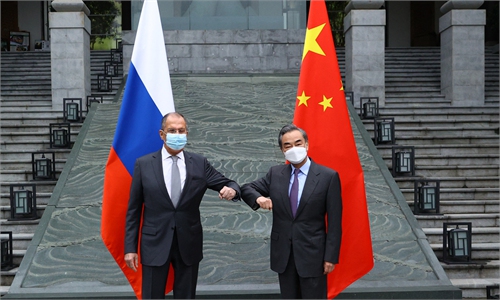
Chinese State Councilor and Foreign Minister Wang Yi (right) meets with Russian Foreign Minister Sergei Lavrov in Guilin, South China's Guangxi Zhuang Autonomous Region on March 23. Photo: courtesy of Chinese Foreign Ministry
The bilateral talks between Chinese State Councilor and Foreign Minister Wang Yi and Russian Foreign Minister Sergei Lavrov have drawn attention from the international community, especially the US and Europe, whose media interpreted the talks as a deliberate arrangement after the China-US high-level meetings in Alaska. Actually, the talks were already on the agenda before US President Joe Biden officially took office in January.A regular meeting between the top diplomats of China and Russia was described as an extraordinary one because of the tensions in China-US and Russia-US relations, with escalating confrontations. Some Western media believed the talks would mark the start of a strategic alliance formed by China and Russia, but this is far from the truth.
First of all, the Guilin talks are a new starting point to deepen China-Russia strategic coordination in the new era. The two top diplomats have coordinated on crucial issues at the vital post-pandemic moment. This included preparations for the meetings of the two countries' leaders and high-level officials and how to renew the Treaty of Good-Neighborliness and Friendly Cooperation between China and Russia and make it more relevant in the new era.
Second, the bilateral talks reflect the two countries' common concerns over the shared future of humanity. In the joint statement released on Tuesday, China and Russia called on the international community to set aside disputes, build consensus, enhance coordination and maintain world peace and geostrategic stability. Both countries oppose politicizing human rights issues and the moves to use human rights and democracy as excuses to interfere in other countries' domestic affairs.
Third, the talks show that China and Russia are determined to protect the world from some countries' manipulations at will. At a press conference after the talks, Wang noted that big powers should lead the world in upholding equity and practicing the UN Charter rather than suppressing others from a position of strength, in respecting others and honoring credibility rather than interfering in other countries at will, in promoting cooperation rather than engaging in zero-sum games and unilateral sanctions, and in abiding by international laws rather than acting in line with ambiguous rules.
Fourth, the talks corroborated the basic principle that China and Russia are strategic partners of coordination that will not form an alliance or engage in confrontation or act against a third party.
As Wang said, the two countries will set examples of strategic mutual trust. China and Russia have built their strategic mutual trust based on firm support of each other's core and major interests. The two countries will jointly oppose color revolutions and safeguard their national sovereignty and political security. What the so-called values-based alliance of the US and European countries is targeting is more than clear.
The two countries will set an example of mutually beneficial cooperation. Without pragmatic cooperation that is mutually beneficial, any strategic partnership is not able to sustain. China and Russia will synergize the Belt and Road Initiative and the Eurasian Economic Union.
China and Russia will set an example of people-to-people connectivity. The strategic partnership of coordination between the two countries is based on their peoples' longstanding friendship, and is also the choice made by the two peoples.
The two will also set an example of equity and justice. China-Russia relations are not only about their interactions but also responsible for maintaining the morality and justice of the world. China and Russia are resolute defenders of equity and justice, and will not allow any country or group of nations to destroy world stability. The more turbulent the world is the further China and Russia will resolutely march forward.
We are in a world of drastic changes unseen in a century. China and Russia are not only good neighbors but also real partners that cannot be torn up. As Lavrov has said, "The fabric of bilateral interaction is so dense that no third force can drive a wedge in it."
After Biden was sworn in, the US' policies on China and Russia are not substantially different from those in the past four years. Although the Biden administration is roping in allies to contain both China and Russia, the two will not respond by forming an alliance. This is a rational choice of Beijing and Moscow both currently and in the future.
Given the two countries' national strength and development, as long as they can stay calm and adhere to the basic rules of the international community while keeping close coordination, no one can harm them.
Provided that China and Russia will strengthen strategic coordination, the world will be safe from certain countries' manipulation and see less hegemony, bullying, and coercion. China-Russia relationship has already become the most important, vital and promising relationship between major powers in the current world.
The author is the deputy dean of the Russian Institute of Tsinghua University. opinion@globaltimes.com.cn


